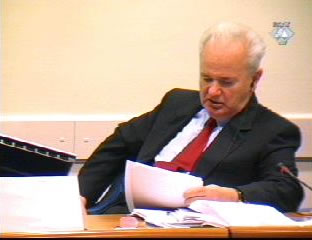Home
MILOSEVIC'S GENOCIDE CHARGES FOR BOSNIA REMAIN
In its decision rendered half-way though Slobodan Milosevic’s trial, the trial Chamber concludes that prosecutors presented enough evidence to find Milosevic guilty of genocide on all counts of the indictment if the accused failed to challenge them successfully during his case.
 Slobodan Miloševic during the cross examination
Slobodan Miloševic during the cross examination Slobodan Milosevic will have to counter all the major allegations in the three indictments against him, including the most serious charge--genocide in Bosnia and Herzegovina. The Trial Chamber concluded that the prosecution presented enough evidence to find Milosevic guilty of genocide on all counts of the indictment if the accused failed to challenge them successfully during his case.
In their motion filed in March, the amici curiae claimed that prosecutors failed to prove beyond a reasonable doubt that the accused acted with specific genocidal intent. Consequently, they sought that counts 1 and 2--genocide and complicity in genocide--be dropped.
In its decision published today, the Trial Chamber dismissed the motion, stating that there existed a joint criminal enterprise, the aim and intention of which was to commit genocide. The decision also stated that according to the evidence presented so far, the participants in that joint criminal enterprise did commit genocide in Brcko, Prijedor, Sanski Most, Srebrenica, Bijeljina, Kljuc and Bosanski Novi.
A majority of the trial Chamber concluded that Milosevic was a participant in a joint criminal enterprise, together with the Bosnian Serb leadership at the time. Judge O-Gon Kwon appended his dissenting opinion, according to which the prosecution failed to prove beyond a reasonable doubt that the accused acted with the intent to destroy Bosnian Muslims, in whole or in part, as an ethnic and religious group.
Apart from this dissenting opinion, Judge Kwon is in agreement with the opinion of the remaining two judges – Robinson and Bonomy – regarding all other conclusions on Milosevic's responsibility for genocide: The Chamber decided unanimously that Milosevic committed crimes that had genocide as their "foreseeable consequence"; that he "aided and abetted" other participants in the joint criminal enterprise, even though he knew they intended to commit genocide; and finally, that he knew or had reason to know that some of his subordinates intended to commit genocide or to take part in it but failed to prevent and punish them.
The demands presented in the amici curiae motion relative to Kosovo and Croatia were likewise dismissed. The Trial Chamber dismissed the claim that there had been no armed conflict in Kosovo before 24 March 1999 and that the conflict in Croatia could not be characterized as international since, according to the amici curiae, Croatia gained statehood "some time between 15 January and 22 May 1992.”
Several requests in the voluminous amici curiae motion to drop specific incidents from the Croatia and BH indictments on grounds of insufficient evidence were granted. The prosecution had admitted as much in its response to their motion.
Linked Reports
- Case : Milosevic Slobodan - "Kosovo, Croatia and Bosnia"
- 2004-05-27 MILOSEVIC'S RETURN TO COURTROOM POSTPONED AGAIN
- 2004-05-05 MILOSEVIC'S RETURN TO COURTROOM POSTPONED
- 2004-05-05 PROSECUTION: ENOUGH EVIDENCE OF MILOSEVIC'S RESPONSIBILITY FOR GENOCIDE IN BH
- 2004-06-17 MILOSEVIC WILL HAVE TO WRITE, IF HE WANTS CLINTON AND BLAIR
- 2004-06-17 UNLIMITED NUMBER OF WITNESSES, BUT IN LIMITED TIME
- 2004-06-21 WHY KARADZIC SHOULD BE IN MILOSEVIC'S BAD BOOKS
